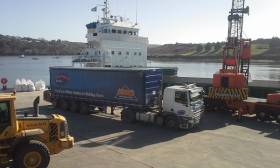Displaying items by tag: Munster Port
#ScenicPort - Scenic Kinsale with its marina and fishing fleet based in the west Cork harbour is widely renowned for its culinary status, however what is probably less known is its commercial shipping activity, writes Jehan Ashmore.
Around 100 cargoships annually call to Port of Kinsale along with occasional transatlantic superyachts and the odd small cruiseship. Commercial ships take the relative anchorage of the outer harbour downriver from the port on the Bandon estuary that is almost landlocked. Chief imports are bulk animal-foods and exports are timber.
In recent days Afloat monitored one of the larger ships to call that been newbuild Arklow Cape launched in October. The 5,085dwt cargoship having been introduced in November was not on a maiden voyage though it was the newbuild's first port of call to the harbour. Since last night the new ship had departed bound for Foynes.
Initially on arrival to Kinsale the 87m Arklow Cape, the second of 10 'C' class sisters on order from ASL had anchored in the outer harbour. This is located closer to the famous Old Head of Kinsale. On board was a cargo of malted barley that had been loaded in Poole, Dorset. The seven crew of the Irish flagged Dutch built ship had sailed from the UK port to Kinsale’s single commercial pier.
Three years ago the pier named Custom Quay was given a €1.1m upgrade by the port’s authority, Cork County Council. The investment in port infrastructure saw an improvement to the 60m pier which was extended by 25m.
On completion of the works, the first ship to use the upgraded 85m pier took place in March 2015 with the berthing of Swami, incidentally a former ASL fleetmate named Arklow Swan. The ship’s agent Bandon Co-op who are the licensed stevedores for the Port of Kinsale, were instrumental in facilitating this inaugural call using the newly extended quay. Swami had discharged 3,800 tonnes of fertiliser.
Other cargoes traded through the south Munster port where handling facilities cater for coal, cement, fertiliser and grain.
The lengthened Custom Quay is a considerable improvement compared to the original pier in which a visit was made to during the last decade.
On that occasion when covering the Port of Kinsale for Inshore-Ireland (August 2005) and Ships Monthly (November 2005) another cargoship, Conformity by coincidence had too made a maiden port of call to the harbour. She arrived from Boston, Lincolnshire with a cargo of wheat feed.
























































